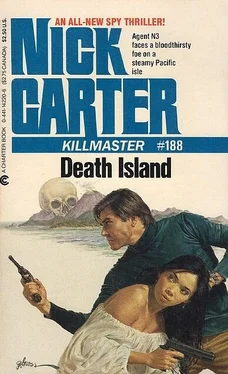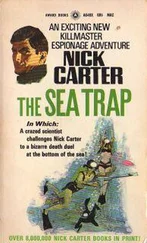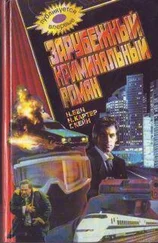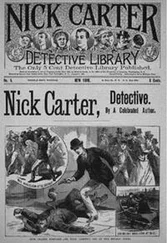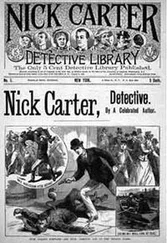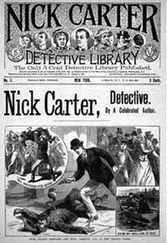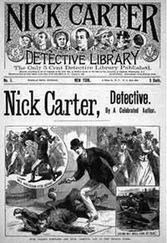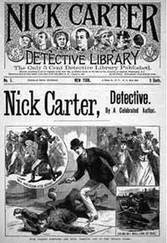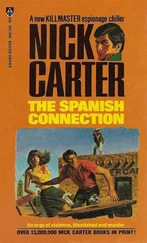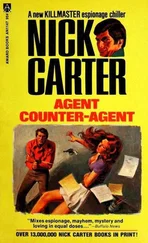The beach curved in toward the south, the jungle coming right down to the water. He had to wade through the gentle waves, the water protected here by the outcropping of land, to get to the other side.
Across the lagoon a small boat was washed up on the beach. There were several figures lying in the sand beside it.
Carter remained where he was for several long seconds, scanning the line of the beach and the jungle to the far point of land.
There was no movement. Nothing lived across the lagoon.
He splashed through the hip-deep water around the last of the vegetation, and then he was running down the beach, his Luger in hand.
As he got closer he could see that there definitely had been a fight between the shore patrol and the natives. The boat on the beach was one of the sixteen-man inflatables. It had been punctured several times by arrows and was partially deflated.
He reached the first of the bodies. He turned it over. It was one of the young crewmen. He had not died of arrow wounds, however. He had been shot with a rifle at least four times. Twice in the chest, once in the throat, and once just below his nose, destroying most of his upper lip.
There were four of them. All had died of gunshot wounds. Carter straightened up and looked inland.
The shore party had come here, had been attacked by the natives, but had nevertheless managed to get off the beach.
Four of them had survived to make it back to the boat. Here they had been cut down by the Chinese patrol. It meant there were still Communist soldiers on the island.
Each of the crewmen carried an M-16 automatic rifle with a stainless steel wire stock and plastic grips.
Carter took one of the weapons, then gathered the ammunition from all four bodies, coming up with a total of five clips of forty rounds each.
He pulled the arrows out of the inflatable and found the pump and repair kit in one of the compartments. The fuel tank and the large outboard motor did not seem to be damaged.
Within a half hour he had repaired the half-dozen punctures and had inflated the three compartments that had been damaged.
The boat was seaworthy again. It would get him back to Hiva Faui a lot faster than an outrigger.
In some of the other compartments were supplies of canned water, some rations, and other equipment. There was even a pair of aluminum paddles with extension handles in case the motor did not work. He could get back to Hiva Faui no matter what.
Slowly he manhandled the heavy raft around so that it was facing outward toward the sea. Then he stopped, straightened up, and looked back toward the volcano rising up into the overcast sky.
The shore party had landed here, and the men had pushed their way inland. Their orders: destroy the dish antenna and projection equipment at the native meeting place Carter had described.
Four of them were dead here on the beach. How about the others? Where were they? Were all of them dead?
Captain Petti said he would be sending an officer, a chief petty officer, and twelve crewmen. It was all he could spare. There were four crewmen here. That left the officer, the petty officer, and eight crewmen.
No way, Carter thought, I can’t leave without finding out what happened to them.
He shoved the extra ammunition clips into his waistband and headed up the beach onto the trail presumably blazed by the Starfish patrol.
A hundred yards inland the petty officer lay on his side with an arrow through his neck, a huge amount of blood beside him. His nametag said Jones.
A half mile farther, two more of the crewmen lay dead, their bodies penetrated by arrows. Here it looked as if the patrol had been attacked and had made a stand, apparently driving off their attackers. Ahead and on either side of the trail were at least two dozen bodies of natives.
It was such a terrible waste, Carter thought. The natives were not really at fault. They had been incited to this by the Chinese.
Carter pushed farther inland, moving higher on the slopes of the foothills at the base of the volcano. Away from the sea, the wind blew only in the treetops. Here at the floor of me jungle it was nearly still, and it was becoming hot.
He stopped and peeled off the wet suit bottoms, tossing them aside. His stiletto was bare on his forearm, and his Luger was stuffed into the waistband of his shorts. He carried the spare ammunition clips in his left hand and the M-16 in his right. He was becoming angry. The farther inland he went, the more bodies he saw, and the angrier he got.
He came across three more of the Starfish’s crew who had been cut down by arrows. Only their bodies had been mutilated afterward. All had been disemboweled, and their genitals had been cut off.
Carter shivered despite the increasing heat and humidity. The officer and three crewmen were all that was left of the shore party. All that were still unaccounted for. But Carter feared if he continued inland, he might be forced to engage some natives, which he did not want to do.
He turned around to start back to the inflatable. And stopped suddenly. He held his breath and listened. In the vague distance he thought he heard something, but it was just the sound of the waves pounding on the beaches and rocks. There was nothing else. The jungle was silent. As if it were waiting for something.
The Chinese troops would probably not be on this side of the island now. When they heard the explosion they had probably all hurried back to their base to find out what happened.
Still, there were four men unaccounted for. Carter decided he had to find out what had happened to them.
Carter checked to make sure the M-16 was ready to fire, then he stepped around the gruesome remains of the three crewmen and headed up the track through the jungle.
The land rose up sharply from this point, and the Starfish patrol had gone up into the hills toward the dish antenna. He and Gabrielle had come to the amphitheater and the dish antenna from the opposite direction, but here the land was essentially the same, the jungle valley to the east and the hills rising to the volcano to the west.
Carter climbed, stopping now and then to scan the valley below, but there was no movement, and everything was quiet.
At the crest of the hill he headed south, almost missing the spot where the dish antenna had been located. He remembered it because of the lightning-struck tree. The tree was still there, but the dish antenna was gone. There were no signs of a fight here. It was very possible that the Chinese, knowing that a patrol was coming — possibly warned by Governor Rondine — had come up here and removed the antenna. They had probably done this before when other U.S. Navy patrols had come ashore.
Carter got down on his hands and knees by the tree and began digging around in the dirt with his stiletto. Almost at once he came up with the end of a cable with a connector. The cable ran directly down the hill in the direction of the amphitheater. The Chinese had unplugged their antenna and had moved it. Probably to a hiding place not far from there.
Carter looked up the hill toward the volcano. Probably up there somewhere. No one would go there looking for it. And even if he did, there would be millions of places to hide the antenna in the natural cracks and crevices in the volcanic rock.
He sheathed his stiletto, grabbed the M-16 where he had leaned it up against the tree, and headed down the hill, the rocks hard on his bare feet.
From here the patrol would have gone directly down the hill to the amphitheater to dismantle the projection equipment. Afterward the survivors had gone back to the beach, where they had been gunned down by the Chinese. Their officer and two of the crewmen had been killed between here and there.
Near the bottom of the hill Carter slowed down, coming at length to the spot where he had pulled up the projection cable and had cut out a fifteen-foot section.
Читать дальше
